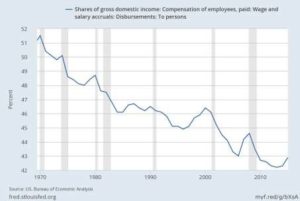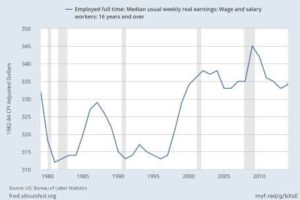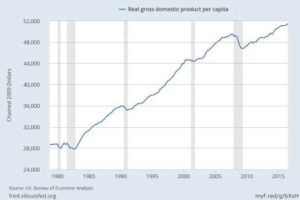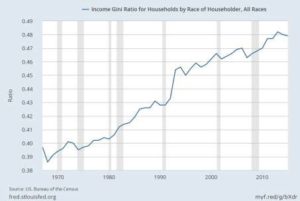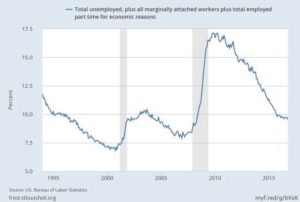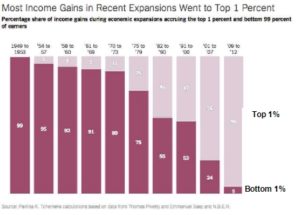The rise of Donald Trump isn’t a purely American phenomenon – Steven Hail
The phenomenon is a global one, and in large degree is a consequence of the blind adherence to an ideological view of the best way to manage economies, which took control of both sides of politics in many countries in the late 1970s and early 1980s, has since then been taken to an extreme – particularly in the US – and has created a mass of resentment and anger among those who feel left behind and disenfranchised by its consequences.
A few facts tell the story of the U.S. over the last generation:
- From 1950-1970, about half of U.S. income was paid out in wages to workers: in recent years, that figure has been only just over 40%.
- Average weekly wages, after allowing for inflation, were almost exactly the same in the U.S. in 2014 as they were in 1979.
- This is despite an approximate doubling in U.S. GDP per person over that same period.
- Income and wealth inequalities increased almost every year during this period, completely undoing the move towards a more equal USA which has happened from the 1930s to the 1970s, and plunging U.S. inequality back to where it was in the 1920s.
- The official unemployment rate has been falling since 2010, but the more meaningful U-6 unemployment rate remains at nearly 10%, with millions of jobs being part-time, poorly paid and insecure.
- There have been 10 economic recoveries, following recessions, in the US since 1945, and the share of the increase in income going to the top 1% has increased from 1% (in the recovery of 1949-53) to 95% (in the years 2009- 2012). That’s not a misprint, and in fact the incomes of the bottom 90% of the US population actually fell during the recovery from the Great Recession of 2009, with more than the whole of the economic expansion going to the richest 10%, and – obviously – especially the top 1%.
Ordinary Americans have had to struggle increasingly hard to get by, and to pay for what most people regard as the basic necessities of a modern life. It has become common for people to take on two or even three jobs to survive, and yet the US has amongst the highest childhood poverty rates in the developed world.
These facts were loudly and repeatedly made clear by Bernie Sanders, in his campaign for the Democratic Party nomination, as he called for changes in government priorities to reverse the increase in inequality, extend access to health care and college education, and move America back onto a path of growing racial, gender, religious and social justice, and away from the cult of individualism, greed and personal wealth for the few.
This has happened during both Democrat and Republican administrations. The name of Clinton is linked by many with the NAFTA free trade agreement with Mexico, which threatened the security and the wages of many low paid Americans; and with measures in the late 1990s that opened up US banking and financial markets to a deregulated free for all, which led eventually to the misery of the Great Recession, and the outrage of a rescue for Wall Street not matched with an equivalent rescue for Main Street.
The Democratic Party leadership, no less than their Republican rivals, came to be seen as part of that Establishment which had abandoned and taken for granted the acquiescence of millions of disenfranchised, frustrated and increasingly disillusioned American voters.
At the very heart of that Establishment appeared to be Hillary Rodham Clinton. And in 2016, many of those angry people struck back.
How strange that, in their anger, they have chosen to support a billionaire like Donald Trump as a means for doing so.
Perhaps the Democratic National Committee should have offered them the chance to vote for Senator Sanders.
More generally, perhaps political elites in many countries around the world should have taken more note of the needs and aspirations of the great mass of the populations whose interests they claim to represent.
Dr Steven Hail is a lecturer in economics at the University of Adelaide, and is an ERA member.
